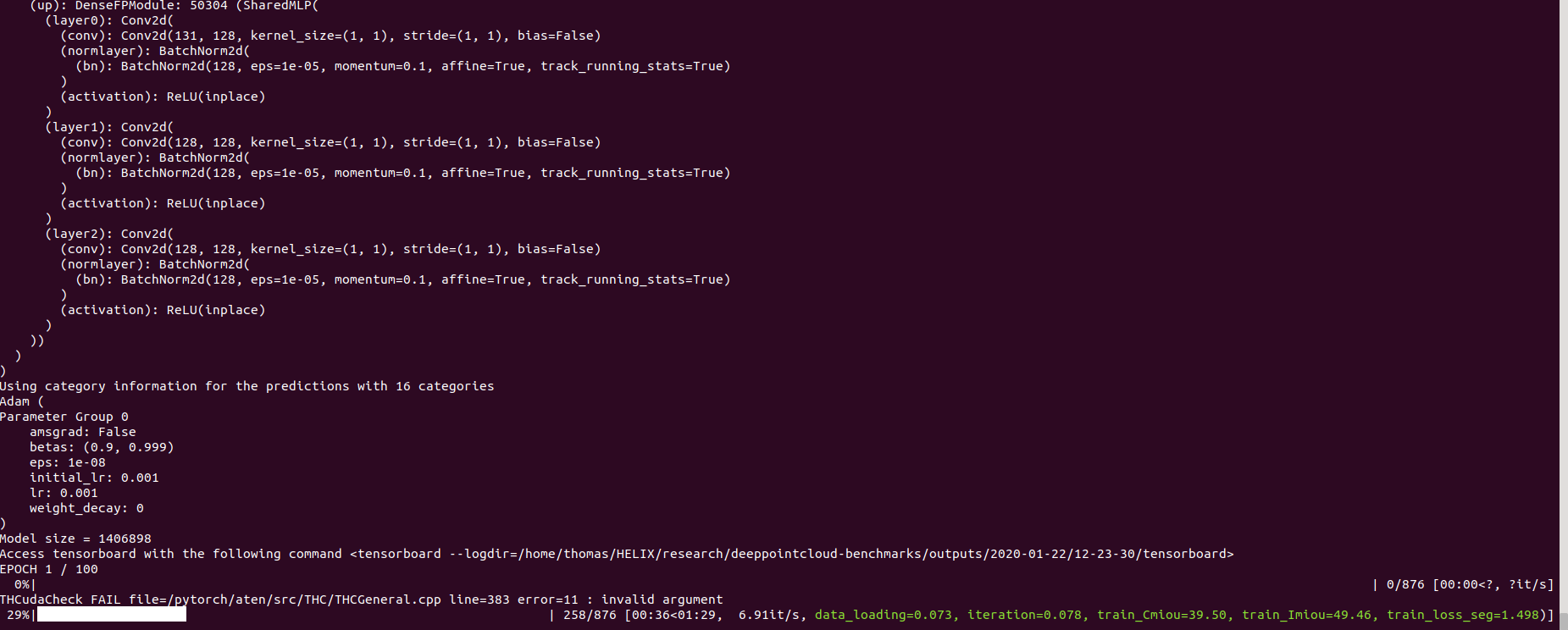deeppointcloud-benchmarks
This is a framework for running common deep learning models for point cloud analysis tasks against classic benchmark. It heavily relies on pytorch geometric and hydra core.
The framework allows lean and yet complex model to be built with minimum effort and great reproducibility.
COMPACT API
# PointNet++: Deep Hierarchical Feature Learning on Point Sets in a Metric Space (https://arxiv.org/abs/1706.02413)
# Credit Charles R. Qi: https://github.com/charlesq34/pointnet2/blob/master/models/pointnet2_part_seg_msg_one_hot.py
pointnet2_onehot:
architecture: pointnet2.PointNet2_D
conv_type: "DENSE"
use_category: True
down_conv:
module_name: PointNetMSGDown
npoint: [1024, 256, 64, 16]
radii: [[0.05, 0.1], [0.1, 0.2], [0.2, 0.4], [0.4, 0.8]]
nsamples: [[16, 32], [16, 32], [16, 32], [16, 32]]
down_conv_nn:
[
[[FEAT, 16, 16, 32], [FEAT, 32, 32, 64]],
[[32 + 64, 64, 64, 128], [32 + 64, 64, 96, 128]],
[[128 + 128, 128, 196, 256], [128 + 128, 128, 196, 256]],
[[256 + 256, 256, 256, 512], [256 + 256, 256, 384, 512]],
]
up_conv:
module_name: DenseFPModule
up_conv_nn:
[
[512 + 512 + 256 + 256, 512, 512],
[512 + 128 + 128, 512, 512],
[512 + 64 + 32, 256, 256],
[256 + FEAT, 128, 128],
]
skip: True
mlp_cls:
nn: [128, 128]
dropout: 0.5
Getting started
Requirements:
- CUDA > 10
- Python 3 + headers (python-dev)
- Poetry (Optional but highly recommended)
Setup repo
Clone the repo to your local machine then run the following command from the root of the repo
poetry install
This will install all required dependencies in a new virtual environment.
Activate it
poetry shell
You can check that the install has been successful by running
python -m unittest
Train pointnet++ on part segmentation task for dataset shapenet
poetry run python train.py task=segmentation model_type=pointnet2 model_name=pointnet2_charlesssg dataset=shapenet
And you should see something like that

Benchmark
S3DIS
| Model Name | # params | Speed Train / Test | Cross Entropy | OAcc | mIou | mAcc |
|---|---|---|---|---|---|---|
pointnet2_original |
3,026,829 | 04:29 / 01:07(RTX 2060) | 0.0512 | 85.26 | 45.58 | 73.11 |
Shapenet part segmentation
The data reported below correspond to the part segmentation problem for Shapenet for all categories. We report against mean instance IoU and mean class IoU (average of the mean instance IoU per class)
| Model Name | Use Normals | # params | Speed Train / Test | Cross Entropy | CmIou | ImIou |
|---|---|---|---|---|---|---|
pointnet2_charlesmsg |
Yes | 1,733,946 | 15:07 / 01:20 (K80) | 0.089 | 82.1 | 85.1 |
RSCNN_MSG |
No | 3,488,417 | 05:40 / 0:24 (RTX 2060) | 0.04 | 82.811 | 85.3 |
Troubleshooting
Undefined symbol / Updating pytorch
When we update the version of pytorch that is used, the compiled packages need to be reinstalled, otherwise you will run into an error that looks like this:
... scatter_cpu.cpython-36m-x86_64-linux-gnu.so: undefined symbol: _ZN3c1012CUDATensorIdEv
This can happen for the following libraries:
- torch-points
- torch-scatter
- torch-cluster
- torch-sparse
An easy way to fix this is to run the following command with the virtualenv activated:
pip uninstall torch-scatter torch-sparse torch-cluster torch-points -y
rm -rf ~/.cache/pip
poetry install
Contributing
Contributions are welcome! The only asks are that you stick to the styling and that you add tests as you add more features!
For styling you can use pre-commit hooks to help you:
pre-commit install
A sequence of checks will be run for you and you may have to add the fixed files again to the stahed files.






